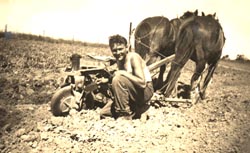| 7 | The Camillo Story |
Dino
Camillo
Dino, first-born of Celeste Camillo of Nervesa, attended
an agricultural school in nearby Conegliano, doing a specialist course in
winery (enologia) at the Istituto Tecnico Agrario G.B, Cerletti, which was
to remain a hobby with him all his life. He even occasionally distilled
his own grappa in the cellar. While still at school, he was a keen
footballer and captained the team.
The ship that was carrying Dino to Australia was held up
in mid-Indian Ocean by a telegram, stating that war had broken out and
that it had to await further instructions. Fortunately for Dino and for
his fellow travellers, the ship was allowed to proceed for Australia. Most
of Dino's classmates were killed on the Russian front, so Celeste's
foresight was in fact providential for Dino ... and for his future
offspring.
At 17 years of age, Dino landed in Melbourne and
immediately went to Werribee to work at his uncle's vegetable farm,
harvesting cabbages. Later on he worked in a weaving factory in Melbourne
and eventually found his way to Myrtleford in central Victoria, where
there was a small Italian community.
As the second world war proceeded, Italy became more and
more hostile towards England and as a consequence, towards its former
colony, Australia. It wasn't long before the Italian migrants were
considered to be enemy and therefore, as a safeguard, they were interned
in work camps in various parts of Australia. Many Italian soldiers
captured by the allies in Italy and Africa, were shipped to prisoner of
war camps in Australia, one of these being in Myrtleford.
Dino, along with his Italian friends, was required to
attend work camps in the pine forest hills around Myrtleford, doing
plantation work. Far from the
horrors of the real war in Europe and working in a fairly relaxed
atmosphere, Dino enjoyed his "imprisonment". He lived in a tent
in the bush and sang around the camp fire at night, after a solid days
work.

Here he made many friends and in Myrtleford met Rina
Rigo, who was soon after to become his wife, in 1944. Dino was 22 and
Rina, being only 20, required special permission.
They were a musical couple, Dino playing the banjo, mandolin and
violin, whereas Rina was good on the guitar and drums.
At wars end, in February of 1945, their first son was
born at the Wangaratta hospital. Shortly afterwards they moved to a
vegetable farm in Albury on the New South Wales border. Their farmhouse,
many years later, became the changing rooms for the Nurial Park football
grounds. Dino tilled the soil there with a horse drawn plough and drove
the produce to market, piled high on an old truck.
Dino had met a German Prisoner of War, Heinz Brunken, who
was not a soldier, but a very distinguished civilian working in England as
a wool classer, when he was arrested at the outbreak of the war. Once
released, Dino hired Heinz on the farm in Albury, who arrived very
elegantly clothed and courageously affronted the hard manual work that
farm life requires. Dino visited Heinz in Germany many years later.
There was also a POW camp in Albury and truckloads of
Italian prisoners passed Dino’s farm every day. In the evening many of
these sneaked out of the camp and visited Dino, always bringing gifts of
meat and cream cakes, of which they were abundantly supplied. The
regulations were very relaxed and Dino even took AWOL prisoners to the
local public swimming pool. One POW borrowed a suit from Dino with which
he attempted to escape, but he was soon found and returned to the camp.
After Albury they moved to Weribee, always in market
farming, where Ivana was born in November 1947. Rina was not happy here,
so one day, already seven months pregnant with Jiannina, she
determinatively set off for Melbourne to seek help from the Archbishop,
whom she had met as a schoolgirl. Having just missed the train, she
hitched a ride to cover the 60 miles and went straight to Saint Patrick's
Cathedral, where, with insistence, she managed to be received by
Archbishop Dr. Mannix himself. He appreciated Rina's determination and
promised to vouch for her at a bank for the necessary financing, once she
had found a suitable investment.

The Camillos later moved to Melbourne, where they purchased two shops in High Street Saint Kilda, a milk bar and a fruit shop, with the bank loan that the Archbishop had kindly arranged. Dino had chosen well and soon after sold the milk bar, recovering most of the purchase loan and continued working in the fruit shop. Jiannina was born in July 1949. The profit from the sale also permitted a trip to Italy in 1952 and the purchase of a "flashy" car in England and a motor through Europe, which was quite a treat for that time. Dino's evident financial success as a migrant, was probably a strong incentive for his brothers and other relatives to follow his footsteps in migrating to Australia, as many subsequently did.
Return to Menu of Camillo Story
l-camillo.com
Copyright L. Camillo 2000